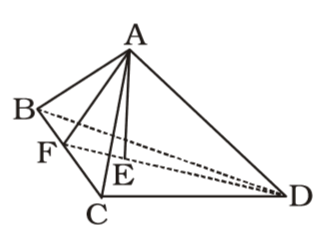Mensuration
- The edges of a rectangular box are in the ratio 1 : 2 : 3 and its surface area is 88 cm². The volume of the box is
-
View Hint View Answer Discuss in Forum
Sides of the box = x, 2x and 3x cm
∴ 2 (x × 2x + 2x × 3x + 3x × x) = 88
⇒ 11x² = 44
⇒ x² = 4
⇒ x = 2
∴ Volume of the box = x × 2x × 3x
= 6x³ = 6 × 8 = 48 cu.cm.Correct Option: B
Sides of the box = x, 2x and 3x cm
∴ 2 (x × 2x + 2x × 3x + 3x × x) = 88
⇒ 11x² = 44
⇒ x² = 4
⇒ x = 2
∴ Volume of the box = x × 2x × 3x
= 6x³ = 6 × 8 = 48 cu.cm.
- A right triangle with sides 3 cm, 4 cm and 5 cm is rotated about the side 3 cm to form a cone, The volume of the cone so formed is
-
View Hint View Answer Discuss in Forum
Clearly, r = 4 cm, h = 3cm.
∴ Volume of cone = 1 πr²h 3 = 1 π × 16 × 3 = 16π cm³ 3 Correct Option: A
Clearly, r = 4 cm, h = 3cm.
∴ Volume of cone = 1 πr²h 3 = 1 π × 16 × 3 = 16π cm³ 3
- If the length of each side of a regular tetrahedron is 12 cm, then the volume of the tetrahedron is
-
View Hint View Answer Discuss in Forum
Volume of the tetrahedron = 1 Area of Base × height 3 ∴ Area of the base = √3 × 12 × 12 = 36√3 sq cm 4
A regular tetrahedron is made up of 4 equilateral triangles.
One is the base triangles and other are the 3 faces.
In ∆DBC, draw DF ⊥ BC. ∆DBC is are equilateral triangle. DF (perpendicular) [DF 1 AF]
= √DC² - FC² = √12² - 6²
= √18 × 6
= 6√3 = AF [altitude of ∆ABC]
[∆ABC is also an equilateral ∆ with side 12cm].FE = 1 × 6√3 = 2√3 cm. 100
[E is the centroid].
∴ AE = √AF² - FE²
= √(6√3)² - (2√3)²
= √108 - 12 = √96 = 4√6 cm∴ Required volume = 1 × 36√3 = 4√3 3
= 144√2 cu.cm.Correct Option: A
Volume of the tetrahedron = 1 Area of Base × height 3 ∴ Area of the base = √3 × 12 × 12 = 36√3 sq cm 4
A regular tetrahedron is made up of 4 equilateral triangles.
One is the base triangles and other are the 3 faces.
In ∆DBC, draw DF ⊥ BC. ∆DBC is are equilateral triangle. DF (perpendicular) [DF 1 AF]
= √DC² - FC² = √12² - 6²
= √18 × 6
= 6√3 = AF [altitude of ∆ABC]
[∆ABC is also an equilateral ∆ with side 12cm].FE = 1 × 6√3 = 2√3 cm. 100
[E is the centroid].
∴ AE = √AF² - FE²
= √(6√3)² - (2√3)²
= √108 - 12 = √96 = 4√6 cm∴ Required volume = 1 × 36√3 = 4√3 3
= 144√2 cu.cm.
- Two right circular cylinders of equal volume have their heights in the ratio 1 : 2. The ratio of their radii is :
-
View Hint View Answer Discuss in Forum

Let radius are r1 and r2 respectively, then πr1²h1 = πr2²h2where h1 and h2 are heights
According to question, h1 : h2 = 1 : 2
∴ r1 : r2 = √h2 : h1 = √2 : 1
= √2 : 1Correct Option: A

Let radius are r1 and r2 respectively, then πr1²h1 = πr2²h2where h1 and h2 are heights
According to question, h1 : h2 = 1 : 2
∴ r1 : r2 = √h2 : h1 = √2 : 1
= √2 : 1
- The height of a triangle is increased by 10%. To retain the original area of the triangle, its corresponding base must be decreased by
-
View Hint View Answer Discuss in Forum
Required per cent = 10 × 100 = 100 = 9 1 % 100 + 10 11 11 Correct Option: D
Required per cent = 10 × 100 = 100 = 9 1 % 100 + 10 11 11

